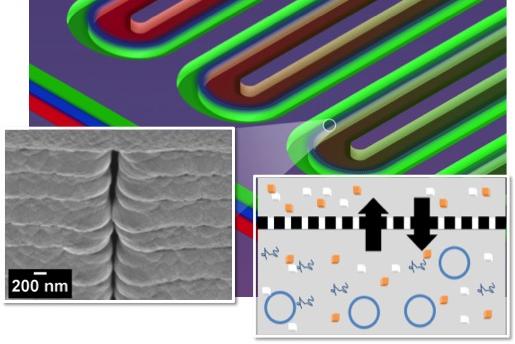 OAK RIDGE, Tenn., Dec. 29, 2015 – Lives of soldiers and others injured in remote locations could be saved with a cell-free protein synthesis system developed at the Department of Energy’s Oak Ridge National Laboratory.
OAK RIDGE, Tenn., Dec. 29, 2015 – Lives of soldiers and others injured in remote locations could be saved with a cell-free protein synthesis system developed at the Department of Energy’s Oak Ridge National Laboratory.
The device, a creation of a team led by Andrea Timm and Scott Retterer of the lab’s Biosciences Division, uses microfabricated bioreactors to facilitate the on-demand production of therapeutic proteins for medicines and biopharmaceuticals. Making these miniature factories cell-free, which eliminates the maintenance of a living system, simplifies the process and lowers cost.
“With this approach, we can produce more protein faster, making our technology ideal for point-of-care use,” Retterer said. “The fact it’s cell-free reduces the infrastructure needed to produce the protein and opens the possibility of creating proteins when and where you need them, bypassing the challenge of keeping the proteins cold during shipment and storage.”
ORNL’s bioreactor features elegance through a permeable nanoporous membrane and serpentine design fabricated using a combination of electron beam and photolithography and advanced material deposition processes. This design enables prolonged cell-free reactions for efficient production of proteins, making it easily adaptable for use in isolated locations and at disaster sites.
From a functional perspective, the design uses long serpentine channels integrated in a way to allow the exchange of materials between parallel reactor and feeder channels. With this approach, the team can control the exchange of metabolites, energy and species that inhibit production of the desired protein. Through other design features, researchers extend reaction times and improve yields.
“We show that the microscale bioreactor design produces higher protein yields than conventional tube-based batch formats and that product yields can be dramatically improved by facilitating small molecule exchange with the dual-channel bioreactor,” the authors wrote in their paper, published in the journal Small.
The researchers also note that on-demand biologic synthesis would aid the production of drugs that are costly to mass-produce, including orphan drugs and personalized medicines.
Read More – Source: ORNL cell-free protein synthesis is potential lifesaver | ORNL
Media Contact
wallira@ornl.gov, 865.576.0226